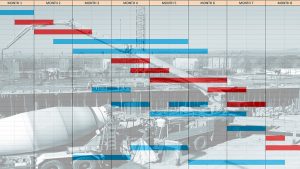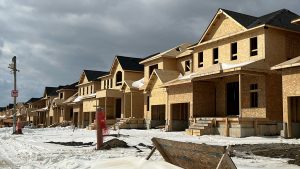The federal government says there is a need to double housing starts and build 5.8 million new homes over the next decade to address the current housing supply crisis.
However, rising interest rates are increasing housing costs and contributing to inflation, which means there will be less housing units of all types built, Canadian Home Builders’ Association (CHBA) president Kevin Lee told the Daily Commercial News.
“Through the pandemic we had low interest rates and as a result we had some really good housing starts numbers over the course of two years.
“The challenge was that it was driving house prices up, but it was resulting in more homes being built,” explained Lee.
Now it’s the opposite. Interest rates have gone up so much that house sales dried up and it’s going to be a much slower year in terms of housing starts in 2023.
“The question is how do you find the right balance?” Lee said.
“You don’t want house prices escalating way too much because of super low interest rates and super high demand. But you also don’t want the situation we’re in right now where we thought we had a bit of a pause in the wintertime and house sales and home sales were starting to come back so we were thinking, ‘OK, maybe it’s not going to be too bad of a year with house starts.’ Now, with another two sets of rate hikes, it’s going to slow down the market again.”
The CHBA is calling on the federal government to implement certain policies to help supply get back on track.
“Hopefully interest rates are going to come down as everybody expects over the next year or two, but even at that point we need to not just get back to business as usual…we need to be increasing our housing starts so we’re going to need some policy help to make that happen,” Lee said.
Targeted measures will allow well-qualified first-time buyers to enter the market.
“We really feel like we need to get 30-year amortizations for insured mortgages for well-qualified first-time buyers,” he said.
“What that enables first-time buyers to do is have lower monthly payments because they’re spreading their mortgage over 30 years.”
While it’s an important move, just helping first-time buyers isn’t going to fix the problem.
“What it will do is help them get into the market and spur more demand in terms of supply and enable builders to build more entry level homes for first-time buyers,” Lee added.
Another way to help with affordability is to update the GST New Housing Rebate thresholds, which were set in 1991 and have not changed since even though house prices in Canada have more than doubled on average over that period.
“Right now you can get the GST rebate if your house is less than $350,000. Well in a lot of urban centres that’s not possible. You can’t get any house, any home, even a condo in some cases, for less than that,” Lee said.
Changing the GST thresholds would support purpose-built rental as well.
“One of the things that’s happened over the past two to three decades is we’ve had very little purpose-built rental,” said Lee. “We think it’s really time to get rid of GST and HST on purpose-built rental properties and that would make the development model and the business model for building those much more viable.”
More investment for housing-enabling infrastructure is another tool the federal government could use. It would help accelerate more development and ideally alleviate the “astronomical development charges” being levied against new projects, a CHBA release states.
“This has been a couple of decades in the making to get into this position so there is no silver bullet for all of this, but we do need a comprehensive approach,” Lee said.
“We need municipalities on board with helping to support more supply of all sorts of new construction: infill, gentle densification…We need to understand that development taxes have gone up by 700 per cent in the past 20 years which is part of the reason why new housing is so expensive.
“We need those ideally to come down and we need infrastructure investments to help offset some of those costs and make new development possible.”
Follow the author on Twitter @DCN_Angela.








Recent Comments
comments for this post are closed